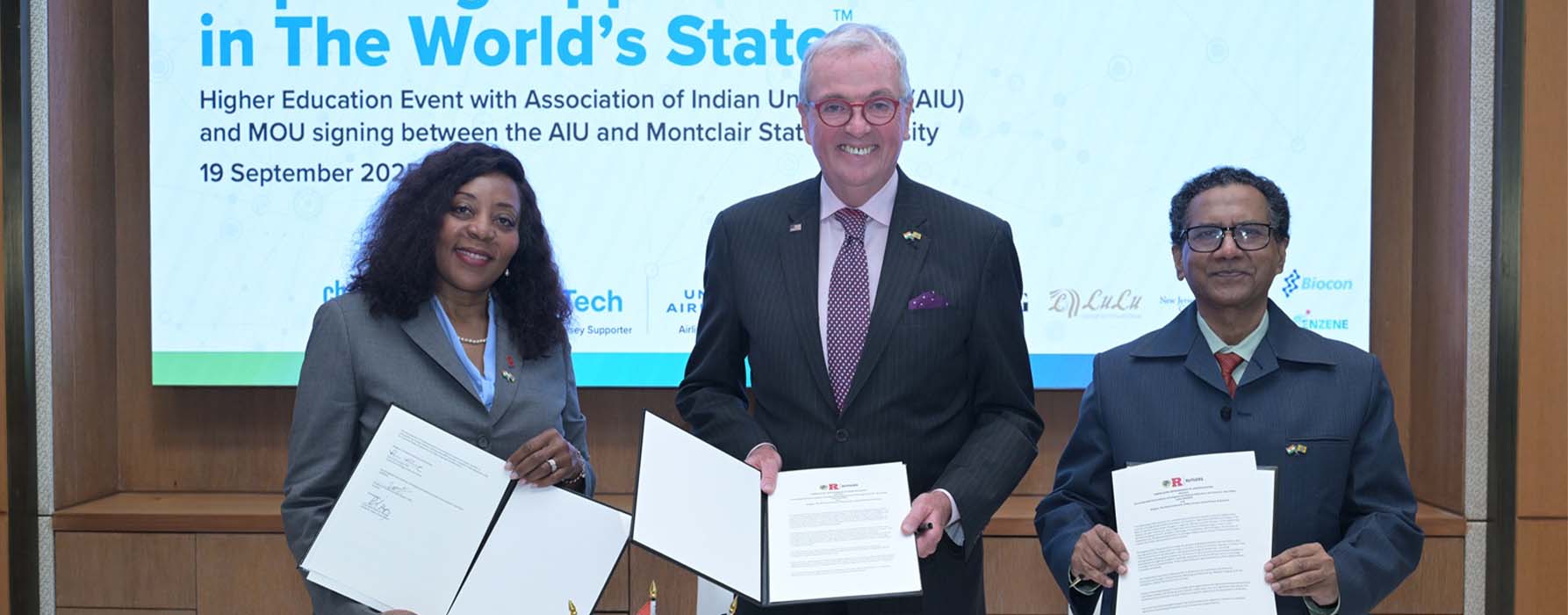Rutgers signs MOU with New Delhi medical education and research institute
BINJE | September 19, 2025

Officials with Rutgers University and Govind Ballabh Pant Institute of Postgraduate Medical Education and Research in New Delhi, one of India’s leading medical institutions, signed a memorandum of understand Friday in New Delhi to establish partnerships aimed at producing ground-breaking cardiovascular research and medical innovation.
Under the terms of the MOU, Rutgers Robert Wood Johnson Medical School’s Division of Cardiovascular Disease and Hypertension, in partnership with GIPMER, will lead the development of collaborations in areas including cardiovascular medicine, cardiovascular surgery, cardiovascular pathology and biobanking, medical imaging, artificial intelligence, digital health, and clinical trials.
Dr. Jamal Yusuf, Head of the Department of Cardiology Surgery at GIPMER, will facilitate the partnership and serve as the primary liaison for the collaboration.
The announcement came on the first day of Gov. Phil Murphy’s second economic mission trip to India — an effort led by Choose New Jersey. (The day also produced an MOU between Montclair State and the Association of Indian Universities to establishes a mutual commitment to academic and cultural exchange).
Murphy was pleased by the agreements.
“This agreement reflects New Jersey’s commitment to building global connections that fuel innovation, improve health care outcomes, and strengthen our state’s higher education leadership,” he said. “The collaboration between Rutgers, Montclair State University, and these leading Indian research institutions will strengthen ties between world-class institutions with the potential to save lives and advance medical knowledge worldwide.”
Rutgers Chief Operating Officer Tony Calcado and Rutgers-New Brunswick Chancellor Francine Conway applauded the agreements.
“We look forward to facilitating collaboration between our faculty and students and leading experts in India on some of the most pressing challenges in cardiovascular health,” Calcado said. “It represents the kind of international academic partnership that drives discovery and improves lives.”
Conway agreed.
“This partnership underscores our commitment to global collaboration that improves patient care, expands research opportunities and prepares the next generation of medical leaders to meet urgent health challenges worldwide,” she said. “As a global university, Rutgers embraces these opportunities to connect our campus with leading institutions abroad, strengthening both our scholarship and our role in addressing the most pressing issues of our time.”
Both MOUs, which lay the foundation for future partnerships, are non-binding agreements that will remain in effect for three years, with the possibility of renewal, Choose New Jersey CEO Wes Mathews said.
“International collaboration contributes to New Jersey’s higher education excellence, resulting in a highly skilled and educated workforce,” he said. “The MOUs signed today represent a continued investment in New Jersey’s advanced research capabilities that will not only advance medical research and treatment, but expand global partnerships and opportunities for our academic community.”
Dr. Muhammad Abid Geelani, the medical director of the Govind Ballabh Pant Institute of Postgraduate Medical Education and director professor of the department of cardiothoracic and vascular surgery, said the partnership could have great impact.
“This collaboration brings together the strengths of our clinicians and researchers with those of a leading U.S. medical school, creating new opportunities to improve patient outcomes, train the next generation of specialists, and contribute to global advances in cardiovascular medicine,” he said.
Yusef agreed.
“We are eager to work closely with Rutgers faculty to share expertise and develop innovative approaches to cardiovascular care,” he said. “Through joint research, clinical training, and the application of new technologies, this partnership will allow us to accelerate advancements that directly benefit patients.”
 Translate
Translate Arabic
Arabic Chinese (Simplified)
Chinese (Simplified) Dutch
Dutch English
English French
French German
German Italian
Italian Portuguese
Portuguese Russian
Russian Spanish
Spanish